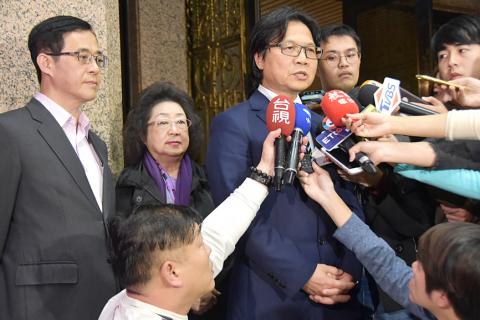Former minister of education Yeh Jiunn-rong (葉俊榮) yesterday defended his decision to approve the appointment of National Taiwan University (NTU) president-elect Kuan Chung-ming (管中閔) as “the right thing” to do “at the right time” after resigning amid a flurry of criticism over his handling of the issue.
Yeh, who took office on July 16, became the third minister of eduction to step down over the NTU presidential election controversy following former ministers Pan Wen-chung (潘文忠) and Wu Maw-kuen (吳茂昆).
“I could have left the ministry without resolving the issue, but I chose to bravely take responsibility for that,” he told reporters at the ministry.

Photo: Wo Po-hsuan, Taipei Times
“I did not just resolve the issue, but I did it in a manner that was in line with university autonomy and legal procedures, and based on my conscience,” he said. “I believe I did the right thing at the right time.”
Although he had to step down, he said he was glad for being “the one who resolved the issue.”
He had done his best in handling the issue knowing it would be impossible to keep everyone happy, he said.
“I hope that my decision to take responsibility and carry the cross would bring things back to normal and allow education to function again,” he said, adding that he could not bear seeing education being stalled at the expense of social opposition.
He said the controversy had led to social opposition beyond the university and he hoped his departure would bring relief to all.
“If my colleagues and I could confront such a difficult issue, can our society please let things go too?” he added
The former minister offered his resignation letter to Premier William Lai (賴清德) at the Executive Yuan at 1pm, saying he was sorry for the criticism his decision has drawn, Executive Yuan Secretary-General Cho Jung-tai (卓榮泰) told a news conference.
Lai did not ask him to stay, but “reluctantly approved” his resignation, Cho said.
The Executive Yuan respects any decision the ministry makes regarding the NTU election, but it must be informed in advance, Cho said.
Yeh only briefly informed Lai via a text message about an hour before he made the announcement to appoint Kuan, and although Lai asked him to carefully reconsider his decision, Yeh did not report back, Cho said.
“I personally believe the process should have been more cautious,” Cho said, adding that respecting each other is essential.
Before Yeh visited the Executive Yuan, President Tsai Ing-wen (蔡英文) had discussed with Lai the ministry’s handling of the NTU controversy at the Presidential Office Building, Presidential Office spokesman Sidney Lin (林鶴明) said before the Executive Yuan news conference.
“Tsai believed the way the matter was handled yesterday was too abrupt. In particular, ruling party legislators were not aware of the decision,” he said.
Tsai had asked the Executive Yuan to handle the matter properly, he said.
Meanwhile, NTU said it is in the process of arranging Kuan’s appointment.
Asked to comment on his appointment, Kuan told reporters waiting outside his office at NTU that he has “no special feelings,” because the school has not yet informed him of its decision.
Additional reporting by Su Yung-yao

CHAOS: Iranians took to the streets playing celebratory music after reports of Khamenei’s death on Saturday, while mourners also gathered in Tehran yesterday Iranian Supreme Leader Ayatollah Ali Khamenei was killed in a major attack on Iran launched by Israel and the US, throwing the future of the Islamic republic into doubt and raising the risk of regional instability. Iranian state television and the state-run IRNA news agency announced the 86-year-old’s death early yesterday. US President Donald Trump said it gave Iranians their “greatest chance” to “take back” their country. The announcements came after a joint US and Israeli aerial bombardment that targeted Iranian military and governmental sites. Trump said the “heavy and pinpoint bombing” would continue through the week or as long

TRUST: The KMT said it respected the US’ timing and considerations, and hoped it would continue to honor its commitments to helping Taiwan bolster its defenses and deterrence US President Donald Trump is delaying a multibillion-dollar arms sale to Taiwan to ensure his visit to Beijing is successful, a New York Times report said. The weapons sales package has stalled in the US Department of State, the report said, citing US officials it did not identify. The White House has told agencies not to push forward ahead of Trump’s meeting with Chinese President Xi Jinping (習近平), it said. The two last month held a phone call to discuss trade and geopolitical flashpoints ahead of the summit. Xi raised the Taiwan issue and urged the US to handle arms sales to

State-run CPC Corp, Taiwan (CPC, 台灣中油) yesterday said that it had confirmed on Saturday night with its liquefied natural gas (LNG) and crude oil suppliers that shipments are proceeding as scheduled and that domestic supplies remain unaffected. The CPC yesterday announced the gasoline and diesel prices will rise by NT$0.2 and NT$0.4 per liter, respectively, starting Monday, citing Middle East tensions and blizzards in the eastern United States. CPC also iterated it has been reducing the proportion of crude oil imports from the Middle East and diversifying its supply sources in the past few years in response to geopolitical risks, expanding

Pro-democracy media tycoon Jimmy Lai’s (黎智英) fraud conviction and prison sentence were yesterday overturned by a Hong Kong court, in a surprise legal decision that comes soon after Lai was jailed for 20 years on a separate national security charge. Judges Jeremy Poon (潘兆初), Anthea Pang (彭寶琴) and Derek Pang (彭偉昌) said in the judgement that they allowed the appeal from Lai, and another defendant in the case, to proceed, as a lower court judge had “erred.” “The Court of Appeal gave them leave to appeal against their conviction, allowed their appeals, quashed the convictions and set aside the sentences,” the judges